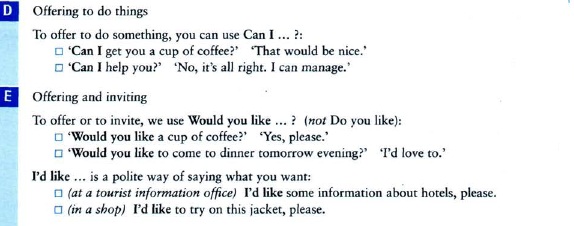Can could would like to
We use the modal verbs can, could and would to offer to do things for people or to invite them to do something. What are modal verbs? They are a type of auxiliary verb we use with other verbs to add more meaning to the verb. Using the word ‘ could ’ to respond to the requests we made in the last example would suggest that you could do it, but you might not really want to.
I like my face <. We all have our hangups! That would be sooo fun! I take Spanish in school. I would love your help! You should try contacting your local college about becoming a midwife. Access course in Nursing and Midwifery which will allows you to gain entry into higher education to become a midwife. WOULD LIKE vs WOULD LIKE TO. When it comes to requests, we can use both could and would, but could is more formal and polite than would.

While making polite requests, could is used with suggestions, as it indicates a possibility. On the contrary, would is used with offers or invites, because it is more usual. Related Differences. If we say "I am able to swim", it is like saying "I can swim".
We sometimes use be able to instead of " can " or " could " for ability. Be able to is possible in all tenses - but " can " is possible only in the present and " could " is possible only in the past for ability.
In addition, " can " and " could " have no infinitive form. The modal verbs can and could represent the ability of a person or thing in doing something.
However, there is a difference in their usage, as ‘ can ‘ is used in present situation, whereas we can use ‘ could ‘ for talking about a past ability. Both are followed by a base form of the verb. Could indicates the ability to do something.
If you are able to do something, YOU CAN DO IT. Will indicates a promise to do something, you have both the intention and ability to do it. To be able to ’ is not a modal auxiliary verb. Could’ and ‘would’ are both used to express conditionality, or the idea that something is not sure or definite, but they have slightly different connotations.
Could’ is used to express possibility, while ‘would’ is used to express definiteness, as long as certain conditions are met. These are used just to express the main verb's mood or state. You can do this grammar quiz online or print it on paper. It tests what you learned on the can, could, be able to page.
Both can and could are used to ask for permission and also request something, can is more informal one, which is used when we are talking to our friends, relatives or acquaintances. However, when talking to strangers, we can use could, to ask for permission or request politely. Can, could or may ? Could is the past tense of can, a verb used to denote ability.

In this sense, could refers to some ability that someone had in the past. In both of these examples, could is being used to express an ability that the speaker had in the past.

They can be distinguished from other verbs by their defectiveness (they do not have participle or infinitive forms) and by their neutralization (that they do not take the ending - (e)s in the third-person singular). Now it takes me minutes! Last year, he couldn’t speak English very well, but now he can.
Could you repeat that? It’s late, you should sleep. Could you please pass that paper? I could swim well when I was a boy. He should have arrived by now. She stood as close to him as she could. Would you like to join us tonight?

Yorumlar
Yorum Gönder